2023-2024学年英语鲁教版(五四学制)九年级全一册Unit 6Sad movies make me cry 单元复习课件 (共27张PPT)
文档属性
| 名称 | 2023-2024学年英语鲁教版(五四学制)九年级全一册Unit 6Sad movies make me cry 单元复习课件 (共27张PPT) |
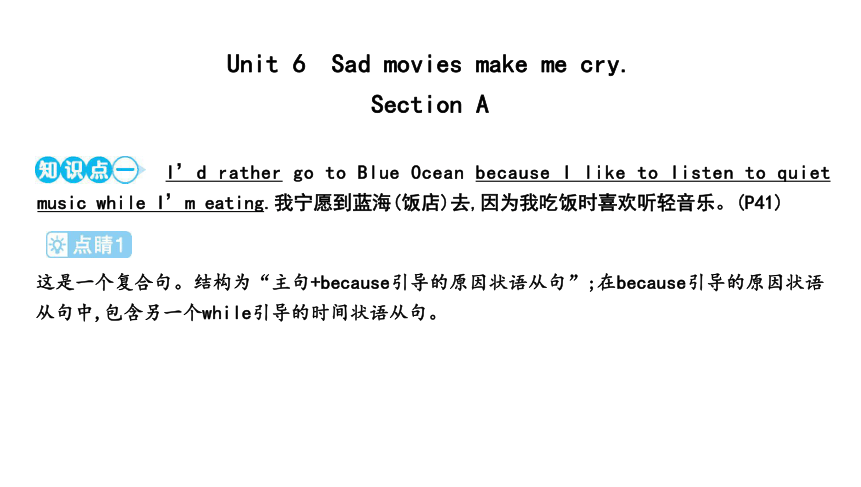
|
|
| 格式 | pptx | ||
| 文件大小 | 338.8KB | ||
| 资源类型 | 教案 | ||
| 版本资源 | 鲁教版 | ||
| 科目 | 英语 | ||
| 更新时间 | 2024-07-08 19:49:21 | ||
图片预览

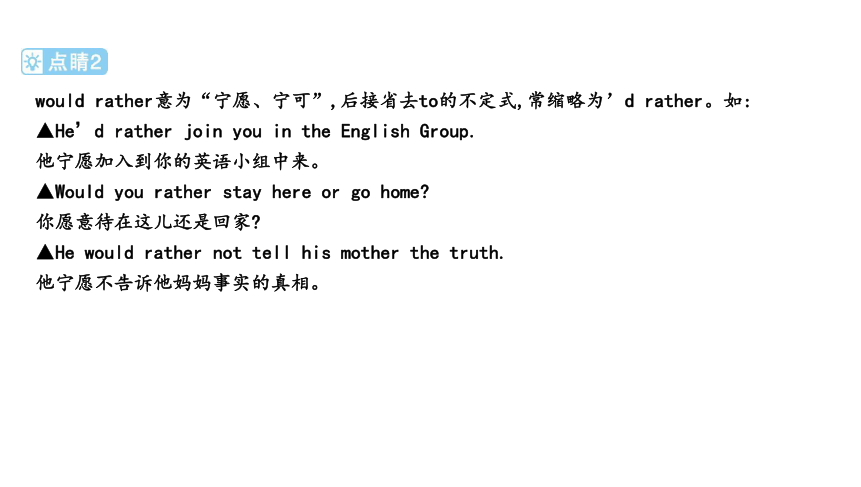
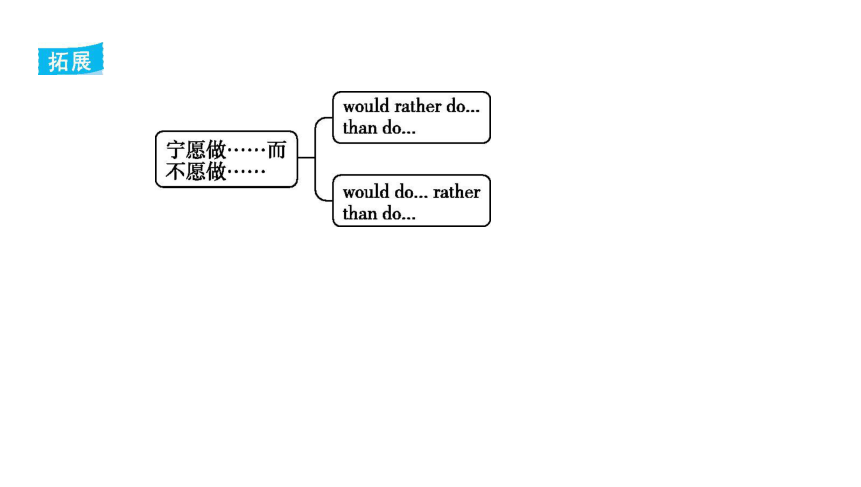
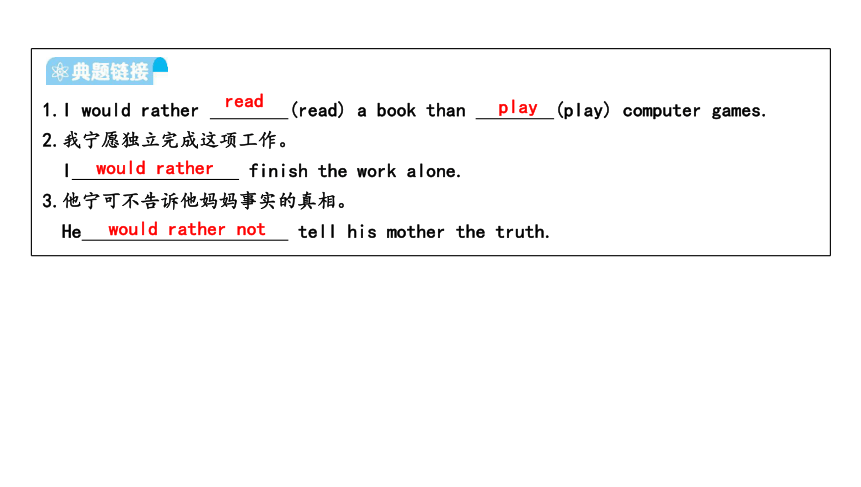
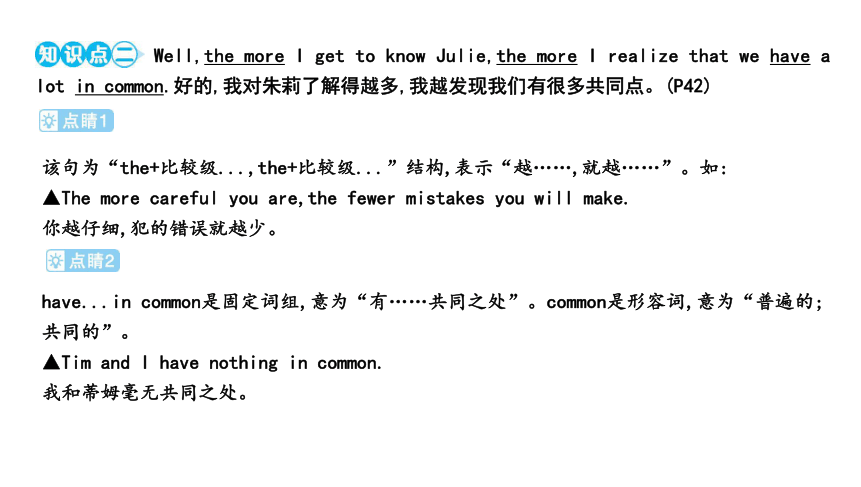
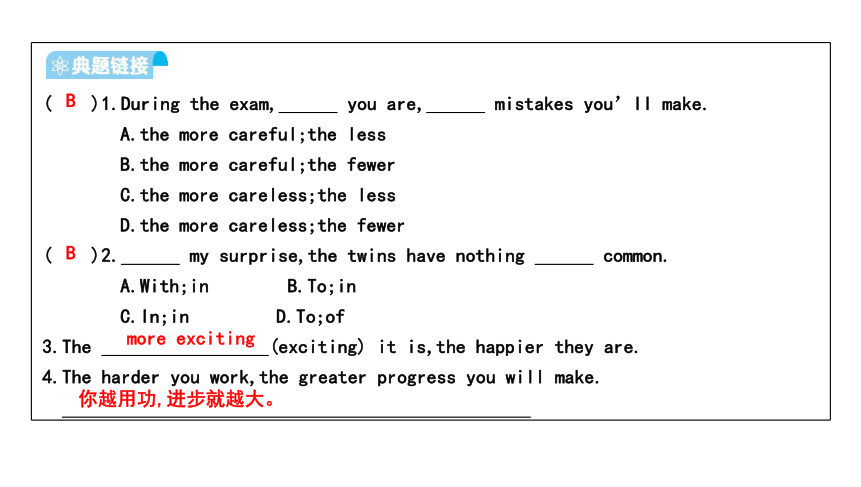
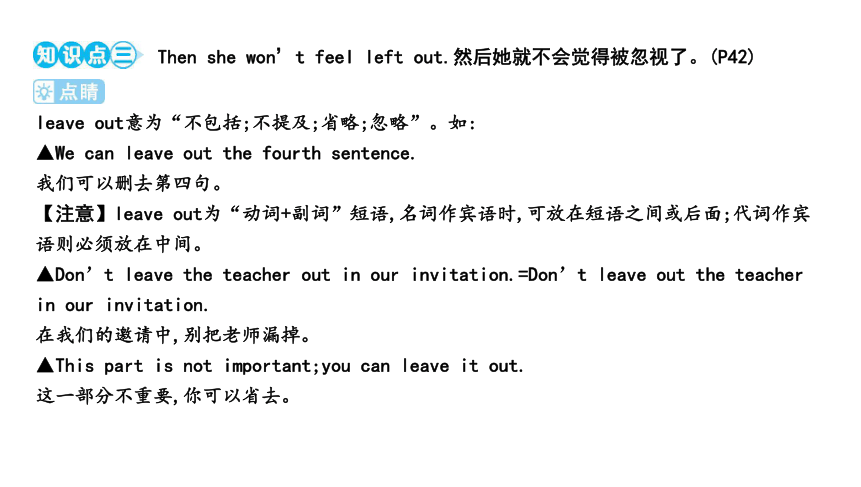
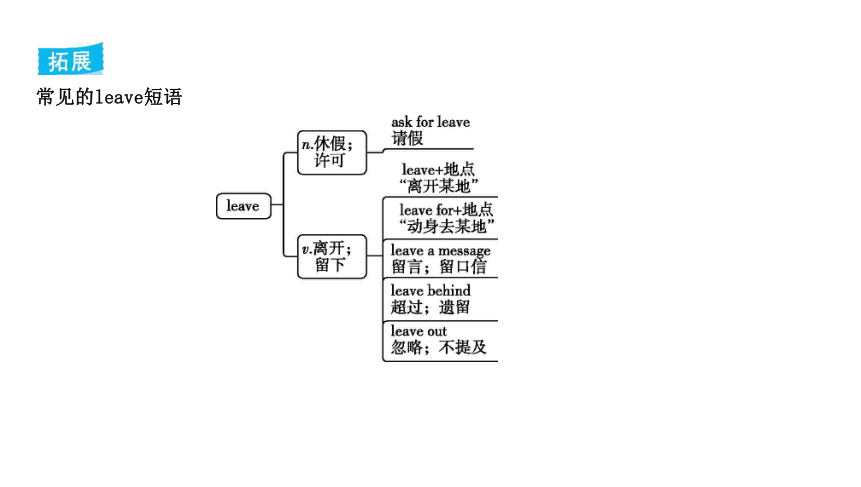
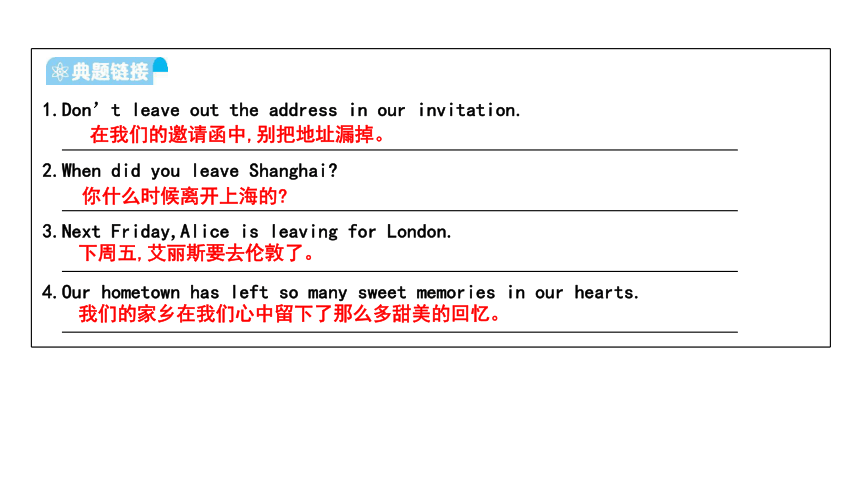
文档简介
(共27张PPT)
Unit 6 Sad movies make me cry.
Section A
I’d rather go to Blue Ocean because I like to listen to quiet music while I’m eating.我宁愿到蓝海(饭店)去,因为我吃饭时喜欢听轻音乐。(P41)
这是一个复合句。结构为“主句+because引导的原因状语从句”;在because引导的原因状语从句中,包含另一个while引导的时间状语从句。
would rather意为“宁愿、宁可”,后接省去to的不定式,常缩略为’d rather。如:
▲He’d rather join you in the English Group.
他宁愿加入到你的英语小组中来。
▲Would you rather stay here or go home
你愿意待在这儿还是回家
▲He would rather not tell his mother the truth.
他宁愿不告诉他妈妈事实的真相。
1.I would rather (read) a book than (play) computer games.
2.我宁愿独立完成这项工作。
I finish the work alone.
3.他宁可不告诉他妈妈事实的真相。
He tell his mother the truth.
read
play
would rather
would rather not
Well,the more I get to know Julie,the more I realize that we have a lot in common.好的,我对朱莉了解得越多,我越发现我们有很多共同点。(P42)
该句为“the+比较级...,the+比较级...”结构,表示“越……,就越……”。如:
▲The more careful you are,the fewer mistakes you will make.
你越仔细,犯的错误就越少。
have...in common是固定词组,意为“有……共同之处”。common是形容词,意为“普遍的;共同的”。
▲Tim and I have nothing in common.
我和蒂姆毫无共同之处。
( )1.During the exam, you are, mistakes you’ll make.
A.the more careful;the less
B.the more careful;the fewer
C.the more careless;the less
D.the more careless;the fewer
( )2. my surprise,the twins have nothing common.
A.With;in B.To;in
C.In;in D.To;of
3.The (exciting) it is,the happier they are.
4.The harder you work,the greater progress you will make.
B
B
more exciting
你越用功,进步就越大。
Then she won’t feel left out.然后她就不会觉得被忽视了。(P42)
leave out意为“不包括;不提及;省略;忽略”。如:
▲We can leave out the fourth sentence.
我们可以删去第四句。
【注意】leave out为“动词+副词”短语,名词作宾语时,可放在短语之间或后面;代词作宾语则必须放在中间。
▲Don’t leave the teacher out in our invitation.=Don’t leave out the teacher in our invitation.
在我们的邀请中,别把老师漏掉。
▲This part is not important;you can leave it out.
这一部分不重要,你可以省去。
常见的leave短语
1.Don’t leave out the address in our invitation.
.
2.When did you leave Shanghai
.
3.Next Friday,Alice is leaving for London.
.
4.Our hometown has left so many sweet memories in our hearts.
.
在我们的邀请函中,别把地址漏掉。
你什么时候离开上海的
下周五,艾丽斯要去伦敦了。
我们的家乡在我们心中留下了那么多甜美的回忆。
call in意为“召来;叫来”。
▲They decided to call in a doctor,because the child was no better.
他们决定请大夫,因为孩子的病情并未好转。
One day,a doctor was called in to examine the king.一天,一位医生被请来为国王做检查。(P43)
常见的call短语
1.他病了,你应该立即请大夫来。
He is ill.You should the doctor right away.
2.I’ll call you back in half an hour.
.
3.Please call me up this evening.
.
4.Can you call the secretary in please
.
call in
半小时后我会给你回打电话的。
请今晚给我打电话。
你能不能把秘书叫来
▲She still finds it uncomfortable to stand without support.
她不扶东西站着仍觉得不舒服。
uncomfortable adj.使人不舒服的;令人不舒适的(P44)
前缀是un-的表否定的单词
1.I couldn’t sleep because the bed was so (comfortable).
2.—Did you hear anything (usual) in the next door
—No,I was chatting online with friends.
3.He was shy and nervous as a boy,and (happy) at school.
uncomfortable
unusual
unusual
Section B
The general searched for three days and found a happy person.将军找了三天,找到了一个快乐的人。(P45)
search for sb./sth.意为“寻找某人/某物”,for后接的是要搜寻的人或物,强调动作。
▲I searched for my lost wallet in the street.
我在大街上找我丢失的钱包。
search作及物动词,后接搜寻的地点或物品时,意为“搜查某处或某物”;后接人时,指“搜某人的身”。
▲They searched every part of the house.
他们把房子的每个角落都搜遍了。
【一言辨异】The man you just searched is the very person the police are searching for.
你刚才搜身的人正好是警察正在寻找的人。
1.目前,数百万的中国人离开农村去城市寻找工作。
Nowadays,millions of Chinese leave the countryside to work in
cities.
2.我们四处找,但还是没找到它。
We everywhere but we still couldn’t find it.
search for
searched
weight不可数名词,意为“重量”。
▲The dog’s weight is 50 pounds.
这只狗的重量是50磅。
He felt like there was a heavy weight on his shoulders as he walked home alone.他独自走回家的时候总感觉有什么东西重重地压在他的肩上。(P46)
weigh动词,意为“有……重;称……重量”。
▲The baby weighs three kilos.
婴儿重三公斤。
▲ The shopkeeper weighed the tomatoes.
店主把西红柿称了一下。
1.The boy (weigh) over 60kg.He is fat and he should eat less.
2.The woman hardly eats meat because of losing (weigh).
weighs
weight
let sb. down意为“使某人失望”,相当于disappoint sb./make sb.disappointed。注意:宾语放置在短语let...down中间。如:
▲Don’t worry.I’ll never let you down.
别担心。我决不会让你失望的。
▲Students have to study hard so as not to let their parents down.
为了不让他们的父母失望,学生们不得不努力学习。
He had let his whole team down.他让整个队失望了。(P46)
( )1.My parents expected me to be the best.I don’t want to let them down.
A.make...happy
B.make...tired
C.make...excited
D.make...disappointed
2.你不应该让老师失望。
You shouldn’t your teacher .
D
let
down
kick sb. off的意思是“将某人除名;开除某人”。如:
▲He was kicked off from the factory.
他被工厂解雇了。
▲If you don’t work hard,the boss will kick you off.
如果你不努力工作,老板就会开除你。
He was really worried that his coach might kick him off the team.他真的很担心他的教练会把他踢出球队。(P46)
kick v.& n.踢;踹;蹬
▲If you can’t kick open the door,just give it another kick.
如果你没有踢开门,就再踢一次。
1.老板早就想解雇那个年轻人了。
The boss already wanted to the young man.
2.The meeting will kick off on Thursday in Beijing.
kick off
本届会议将于周四在北京召开。
rather than意为“并非;而不是”,作连词词组使用,连接名词、代词、形容词、介词短语、动词-ing形式或不定式短语等。如:
▲He went to the park in the evening rather than in the morning.
他晚上去公园,而不是早上去。
▲I decided to write rather than telephone.
我决定写信而不打电话。
▲She enjoys singing rather than dancing.
她喜欢唱歌,而不喜欢跳舞。
▲The shoes are comfortable rather than expensive.
这双鞋舒适而不昂贵。
The next day,Peter went to soccer practice with courage rather than fear in his heart.第二天,彼得并没有害怕,而是勇敢地去参加足球训练。(P46)
rather than可与would连用,构成would rather do sth.than do sth.结构;rather than还可与prefer连用,构成prefer to do sth.rather than do sth.结构,意思是“宁愿……也不……”。如:
▲He would tell a lie rather than get his friend into trouble.
他宁愿说谎也不愿连累朋友。
▲I prefer to go swimming rather than go cycling.
我宁愿去游泳,也不愿骑自行车。
1.Nowadays,most people prefer to play computer games rather than read books.
2.I think I’ll have a cold drink rather than coffee.
.
3.She’d rather die than lose the children.
.
4.你做这件事不是为别人而是为你自己。
You are doing this for yourself for others.
如今绝大多数人宁愿玩电脑游戏也不读书。
我想要一杯冷饮,而不是咖啡。
她宁愿死也不愿失去孩子们。
rather than
Unit 6 Sad movies make me cry.
Section A
I’d rather go to Blue Ocean because I like to listen to quiet music while I’m eating.我宁愿到蓝海(饭店)去,因为我吃饭时喜欢听轻音乐。(P41)
这是一个复合句。结构为“主句+because引导的原因状语从句”;在because引导的原因状语从句中,包含另一个while引导的时间状语从句。
would rather意为“宁愿、宁可”,后接省去to的不定式,常缩略为’d rather。如:
▲He’d rather join you in the English Group.
他宁愿加入到你的英语小组中来。
▲Would you rather stay here or go home
你愿意待在这儿还是回家
▲He would rather not tell his mother the truth.
他宁愿不告诉他妈妈事实的真相。
1.I would rather (read) a book than (play) computer games.
2.我宁愿独立完成这项工作。
I finish the work alone.
3.他宁可不告诉他妈妈事实的真相。
He tell his mother the truth.
read
play
would rather
would rather not
Well,the more I get to know Julie,the more I realize that we have a lot in common.好的,我对朱莉了解得越多,我越发现我们有很多共同点。(P42)
该句为“the+比较级...,the+比较级...”结构,表示“越……,就越……”。如:
▲The more careful you are,the fewer mistakes you will make.
你越仔细,犯的错误就越少。
have...in common是固定词组,意为“有……共同之处”。common是形容词,意为“普遍的;共同的”。
▲Tim and I have nothing in common.
我和蒂姆毫无共同之处。
( )1.During the exam, you are, mistakes you’ll make.
A.the more careful;the less
B.the more careful;the fewer
C.the more careless;the less
D.the more careless;the fewer
( )2. my surprise,the twins have nothing common.
A.With;in B.To;in
C.In;in D.To;of
3.The (exciting) it is,the happier they are.
4.The harder you work,the greater progress you will make.
B
B
more exciting
你越用功,进步就越大。
Then she won’t feel left out.然后她就不会觉得被忽视了。(P42)
leave out意为“不包括;不提及;省略;忽略”。如:
▲We can leave out the fourth sentence.
我们可以删去第四句。
【注意】leave out为“动词+副词”短语,名词作宾语时,可放在短语之间或后面;代词作宾语则必须放在中间。
▲Don’t leave the teacher out in our invitation.=Don’t leave out the teacher in our invitation.
在我们的邀请中,别把老师漏掉。
▲This part is not important;you can leave it out.
这一部分不重要,你可以省去。
常见的leave短语
1.Don’t leave out the address in our invitation.
.
2.When did you leave Shanghai
.
3.Next Friday,Alice is leaving for London.
.
4.Our hometown has left so many sweet memories in our hearts.
.
在我们的邀请函中,别把地址漏掉。
你什么时候离开上海的
下周五,艾丽斯要去伦敦了。
我们的家乡在我们心中留下了那么多甜美的回忆。
call in意为“召来;叫来”。
▲They decided to call in a doctor,because the child was no better.
他们决定请大夫,因为孩子的病情并未好转。
One day,a doctor was called in to examine the king.一天,一位医生被请来为国王做检查。(P43)
常见的call短语
1.他病了,你应该立即请大夫来。
He is ill.You should the doctor right away.
2.I’ll call you back in half an hour.
.
3.Please call me up this evening.
.
4.Can you call the secretary in please
.
call in
半小时后我会给你回打电话的。
请今晚给我打电话。
你能不能把秘书叫来
▲She still finds it uncomfortable to stand without support.
她不扶东西站着仍觉得不舒服。
uncomfortable adj.使人不舒服的;令人不舒适的(P44)
前缀是un-的表否定的单词
1.I couldn’t sleep because the bed was so (comfortable).
2.—Did you hear anything (usual) in the next door
—No,I was chatting online with friends.
3.He was shy and nervous as a boy,and (happy) at school.
uncomfortable
unusual
unusual
Section B
The general searched for three days and found a happy person.将军找了三天,找到了一个快乐的人。(P45)
search for sb./sth.意为“寻找某人/某物”,for后接的是要搜寻的人或物,强调动作。
▲I searched for my lost wallet in the street.
我在大街上找我丢失的钱包。
search作及物动词,后接搜寻的地点或物品时,意为“搜查某处或某物”;后接人时,指“搜某人的身”。
▲They searched every part of the house.
他们把房子的每个角落都搜遍了。
【一言辨异】The man you just searched is the very person the police are searching for.
你刚才搜身的人正好是警察正在寻找的人。
1.目前,数百万的中国人离开农村去城市寻找工作。
Nowadays,millions of Chinese leave the countryside to work in
cities.
2.我们四处找,但还是没找到它。
We everywhere but we still couldn’t find it.
search for
searched
weight不可数名词,意为“重量”。
▲The dog’s weight is 50 pounds.
这只狗的重量是50磅。
He felt like there was a heavy weight on his shoulders as he walked home alone.他独自走回家的时候总感觉有什么东西重重地压在他的肩上。(P46)
weigh动词,意为“有……重;称……重量”。
▲The baby weighs three kilos.
婴儿重三公斤。
▲ The shopkeeper weighed the tomatoes.
店主把西红柿称了一下。
1.The boy (weigh) over 60kg.He is fat and he should eat less.
2.The woman hardly eats meat because of losing (weigh).
weighs
weight
let sb. down意为“使某人失望”,相当于disappoint sb./make sb.disappointed。注意:宾语放置在短语let...down中间。如:
▲Don’t worry.I’ll never let you down.
别担心。我决不会让你失望的。
▲Students have to study hard so as not to let their parents down.
为了不让他们的父母失望,学生们不得不努力学习。
He had let his whole team down.他让整个队失望了。(P46)
( )1.My parents expected me to be the best.I don’t want to let them down.
A.make...happy
B.make...tired
C.make...excited
D.make...disappointed
2.你不应该让老师失望。
You shouldn’t your teacher .
D
let
down
kick sb. off的意思是“将某人除名;开除某人”。如:
▲He was kicked off from the factory.
他被工厂解雇了。
▲If you don’t work hard,the boss will kick you off.
如果你不努力工作,老板就会开除你。
He was really worried that his coach might kick him off the team.他真的很担心他的教练会把他踢出球队。(P46)
kick v.& n.踢;踹;蹬
▲If you can’t kick open the door,just give it another kick.
如果你没有踢开门,就再踢一次。
1.老板早就想解雇那个年轻人了。
The boss already wanted to the young man.
2.The meeting will kick off on Thursday in Beijing.
kick off
本届会议将于周四在北京召开。
rather than意为“并非;而不是”,作连词词组使用,连接名词、代词、形容词、介词短语、动词-ing形式或不定式短语等。如:
▲He went to the park in the evening rather than in the morning.
他晚上去公园,而不是早上去。
▲I decided to write rather than telephone.
我决定写信而不打电话。
▲She enjoys singing rather than dancing.
她喜欢唱歌,而不喜欢跳舞。
▲The shoes are comfortable rather than expensive.
这双鞋舒适而不昂贵。
The next day,Peter went to soccer practice with courage rather than fear in his heart.第二天,彼得并没有害怕,而是勇敢地去参加足球训练。(P46)
rather than可与would连用,构成would rather do sth.than do sth.结构;rather than还可与prefer连用,构成prefer to do sth.rather than do sth.结构,意思是“宁愿……也不……”。如:
▲He would tell a lie rather than get his friend into trouble.
他宁愿说谎也不愿连累朋友。
▲I prefer to go swimming rather than go cycling.
我宁愿去游泳,也不愿骑自行车。
1.Nowadays,most people prefer to play computer games rather than read books.
2.I think I’ll have a cold drink rather than coffee.
.
3.She’d rather die than lose the children.
.
4.你做这件事不是为别人而是为你自己。
You are doing this for yourself for others.
如今绝大多数人宁愿玩电脑游戏也不读书。
我想要一杯冷饮,而不是咖啡。
她宁愿死也不愿失去孩子们。
rather than
同课章节目录
- Unit 1 When was it invented?
- Section A
- Section B
- Unit 2 Teenagers should be allowed to choose their
- Section A
- Section B
- Unit 3 It must belong to Carla.
- Section A
- Section B
- Unit 4 I like music that I can dance to.
- Section A
- Section B
- Unit 5 You’re supposed to shake hands.
- Section A
- Section B
- Unit 6 Sad movies make me cry.
- Section A
- Section B
- Unit 7 Life is full of the unexpected.
- Section A
- Section B
- Unit 8 We're trying to save the earth!
- Section A
- Section B
- Unit 9 It's important to have good habits.
- Section A
- Section B
- Unit 10 I remember meeting all of you in Grade 6.
- Section A
- Section B
